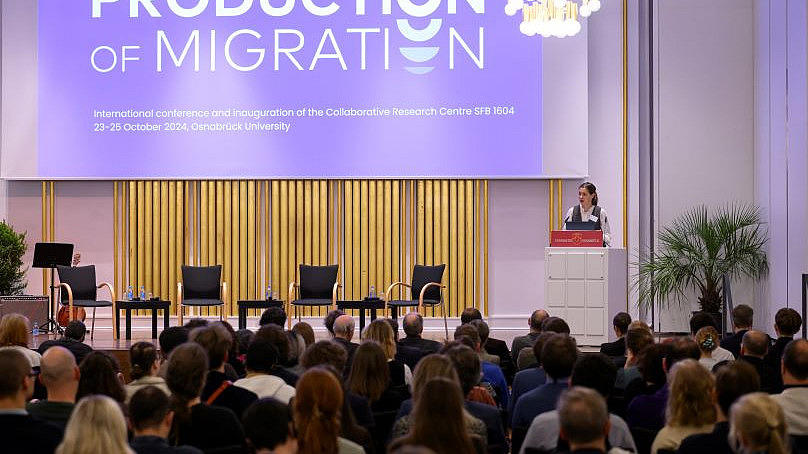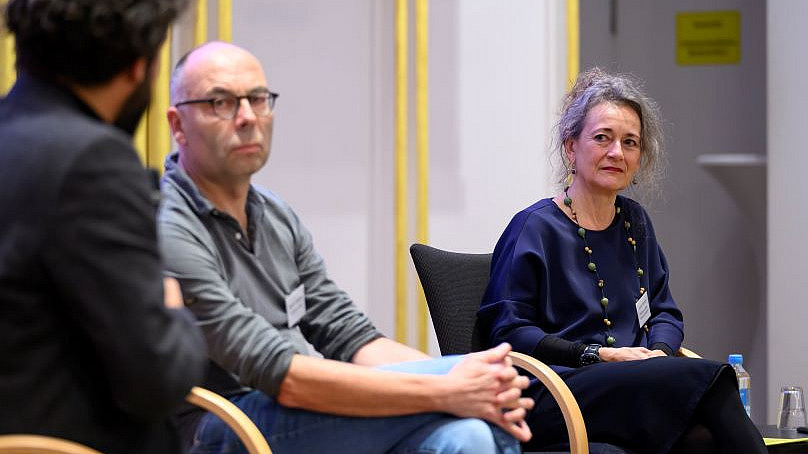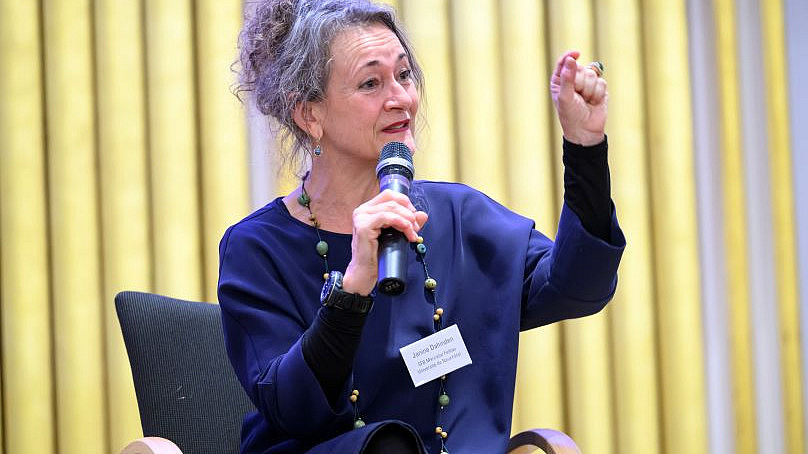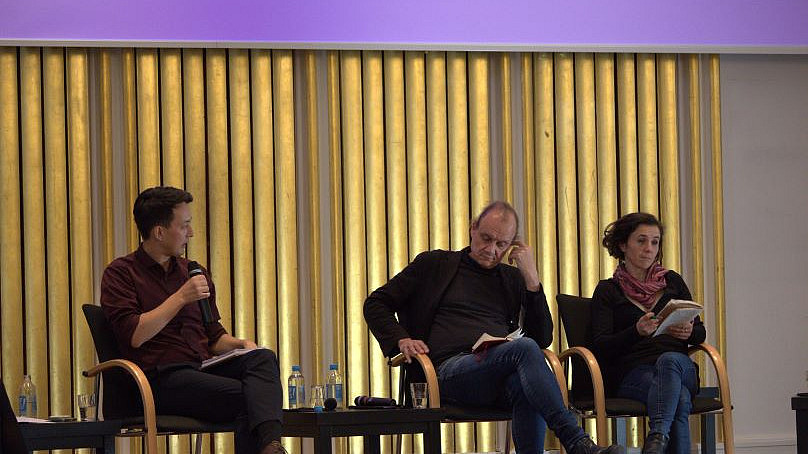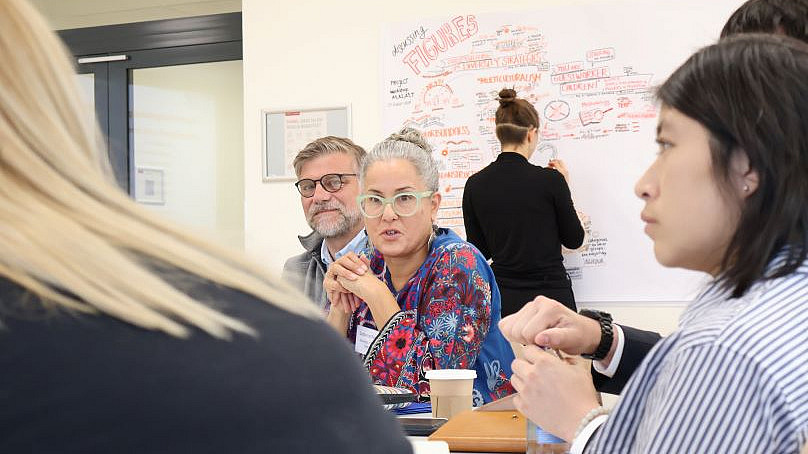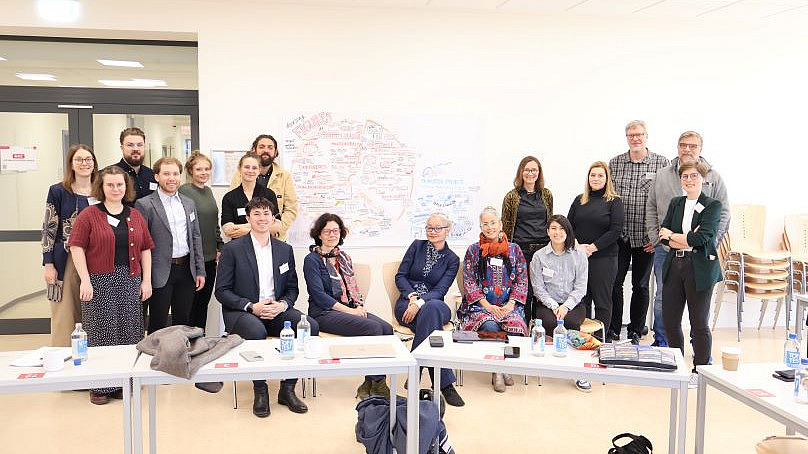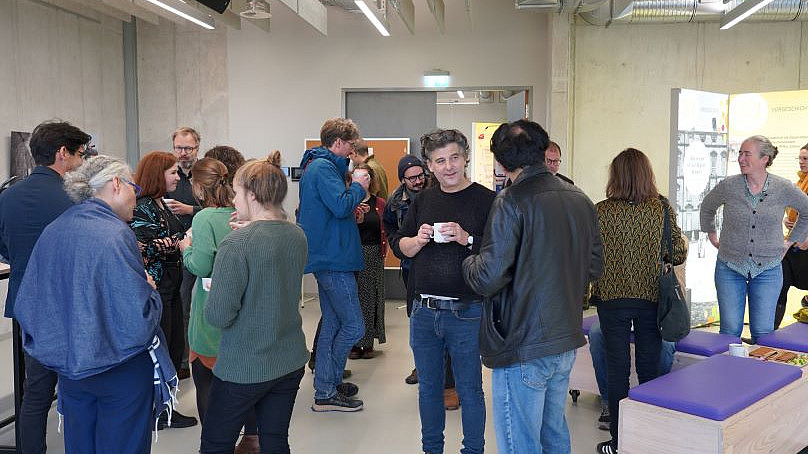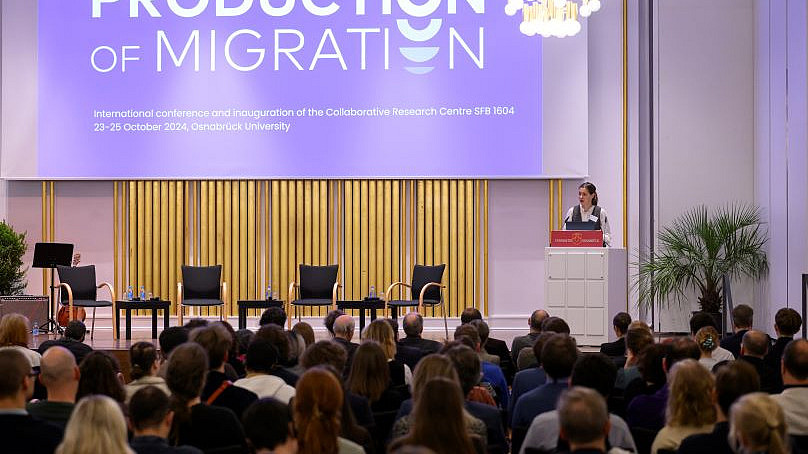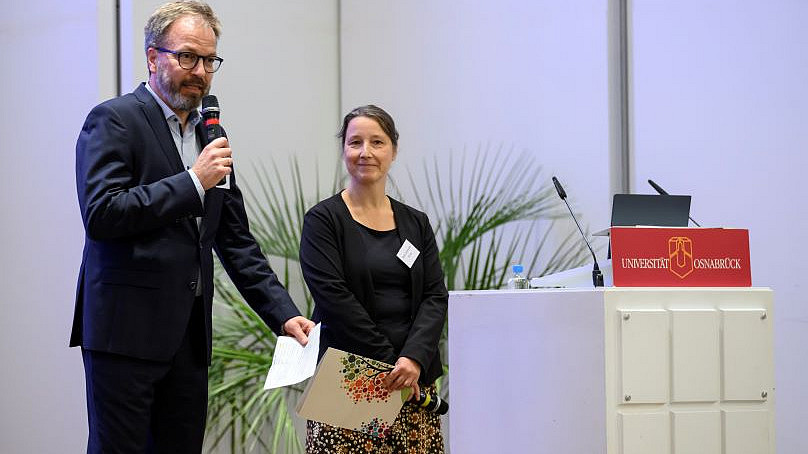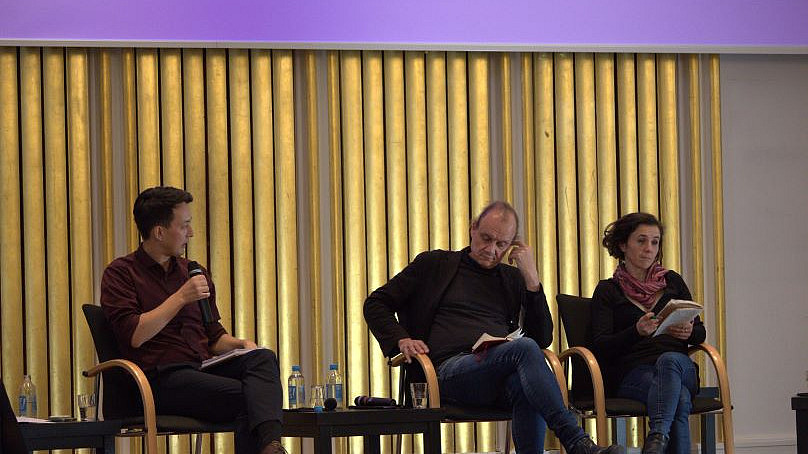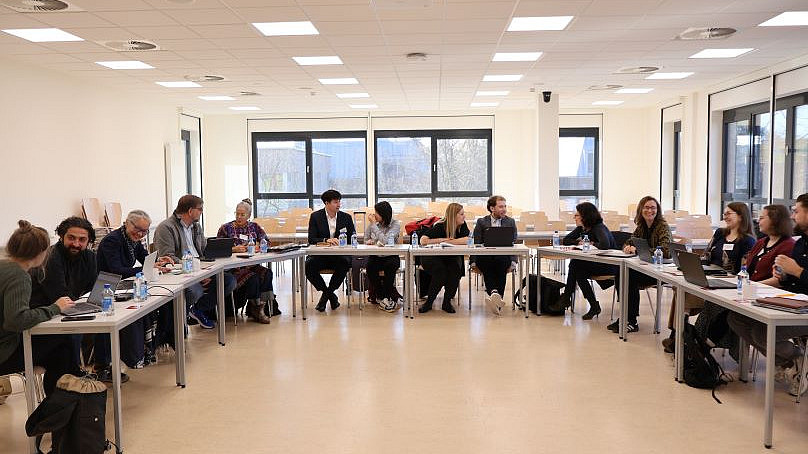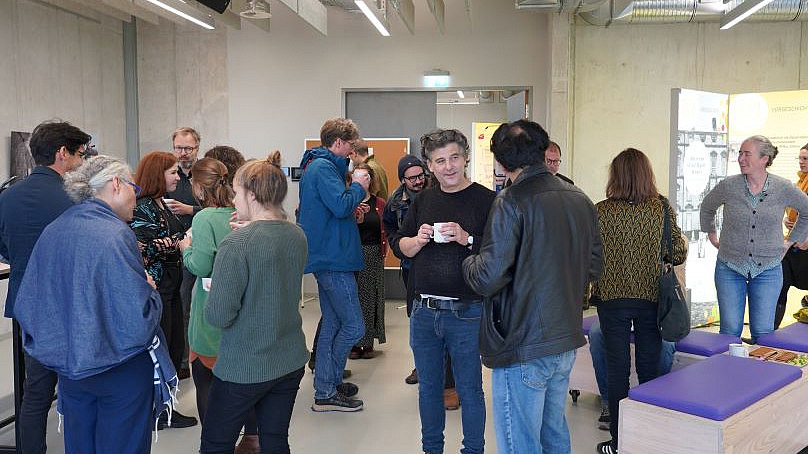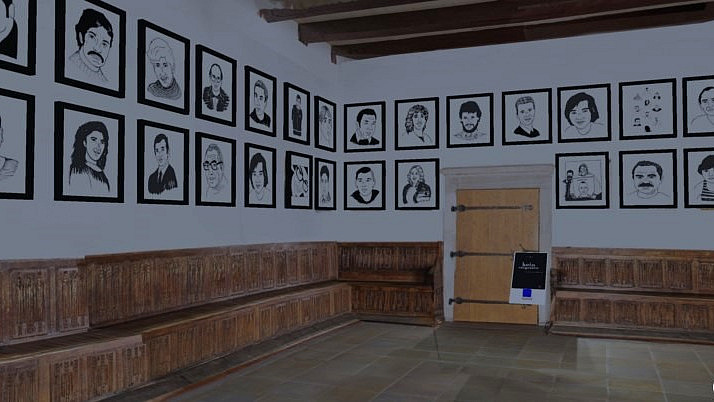International Conference and Inauguration 2024
›Production of Migration: Figures, Infrastructures and Spaces‹
International Conference and Inauguration of the Collaborative Research Centre SFB 1604
23-25 October 2024, Osnabrück University
Around 160 migration researchers attended the inaugural conference of the Collaborative Research Centre ›Production of Migration‹ (SFB 1604). The SFB (launched in April) was officially opened by Susanne Menzel-Riedl (President of Osnabrück University), Andreas Pott (Spokesperson of the SFB) and Helen Schwenken (Director of the Institute for Migration Research and Intercultural Studies, IMIS), followed by a panel discussion on the challenges of migration research in times of social polarisation. The discussion then focused on the research programme of the SFB: What does ›production of migration‹ mean? How do certain figures, infrastructures and spaces contribute to the social production, negotiation and problematisation of migration? These questions were presented and discussed by renowned international scholars. At the end of the conference, experts from Germany and abroad provided important inputs for the concrete research work of the 17 subprojects in half-day workshops. The reflection and further development of theoretical and methodological considerations benefited from the interdisciplinary character of the conference, which brought together perspectives from a wide range of disciplines: from geography to law, from history to psychology, from sociology to linguistics.
Opening of the SFB 1604 | Wednesday, 23 October
| 18:00-20:00 | Opening addresses by SUSANNE MENZEL-RIEDL (President of Osnabrück University), FALKO MOHRS (Minister for Science and Culture, Video message), ANDREAS POTT (SFB Spokesperson) and HELEN SCHWENKEN (IMIS Director) |
| Panel discussion ›Migration research in times of social polarisation‹ with JANINE DAHINDEN (Neuchâtel), THOMAS GROß (SFB), STEPHAN LESSENICH (Frankfurt am Main) and ALADIN EL-MAFAALANI (SFB) | |
| 20:00 | Reception |
International conference | Thursday, 24 October
| 9.00-9.30 | PRODUCTION OF MIGRATION |
| ANDREAS POTT (SFB): Introduction into the SFB’s Research Programme | |
| 9.30-11.00 | FIGURES |
| CATHERINE S. RAMÍREZ (Santa Cruz): The Figure of the Migrant in the Postmigrant Moment | |
| KAREN PHALET (Leuven): The Social Production of Unequal Belonging: How Different Diversity Policies and Experiences Define Belonging for Muslim Immigrant Minorities in European Societies | |
| Chair: CHRISTOPH RASS (SFB) | |
| 11.30-13.00 | MIGRATION RESEARCH AND KNOWLEDGE PRODUCTION |
| Round Table with ADRIAN FAVELL (Cork), MAURICE STIERL (SFB), MARTINA TAZZIOLI (Bologna) | |
| Chairs: ISABELLA LÖHR (SFB) and JANINE DAHINDEN (Neuchâtel) | |
| 14.00-15.30 | INFRASTRUCTURES |
| THOMAS SPIJKERBOER (Gent): The Global Mobility Infrastructure: Reconceptualising the Externalisation of Migration Control | |
| FEDERICA INFANTINO (Nice): Private Companies, Bureaucracies, Intermediaries, and People on the Move: A Street-Level View of Migration Infrastructuring | |
| Comment: SEBASTIAN COBARRUBIAS (Zaragoza) | |
| Chair: ULRICH SCHNECKENER (SFB) | |
| 15.30-16.00 | VIRTUAL PRODUCTIONS |
| Presentation ›Building Exhibitions, Changing Places‹ with the Transfer Project Team (SFB) | |
| 16.30-18.00 | SPACES |
| PARVATI RAGHURAM (Open University): The Spaces of Migration | |
| HENK VAN HOUTUM (Nijmegen): Free the Map: Towards a New Cartography of Migration | |
| Chair: CHRISTINE LANG (SFB) | |
| 18.00-18.30 | REFLECTION |
| Commentaries by CHRISTIANE REINECKE (SFB) and BORIS NIESWAND (Tübingen) | |
| Chair: HELEN SCHWENKEN (SFB) |
Project workshops | Friday, 25 October
Invited speakers:
Dr. Sebastián Cobarrubias (Geography, ARAID Research Foundation/University of Zaragoza)
Prof. Dr. Janine Dahinden (Transnational Studies, SFB 1604 Mercator Fellow, University of Neuchâtel)
Prof. Dr. Adrian Favell (Social and Political Theory, University College Cork)
Dr. Federica Infantino (Migration Studies, Université Côte d'Azur)
Prof. Dr. Stephan Lessenich (Sociology, Goethe University Frankfurt & Institute for Social Research)
Prof. Dr. Boris Nieswand (Sociology, University of Tübingen)
Prof. Dr. Karen Phalet (Social and Cultural Psychology, KU Leuven)
Prof. Dr. Parvati Raghuram (Geography, The Open University)
Prof. Dr. Catherine S. Ramírez (Latin American and Latino Studies, University of California, Santa Cruz)
Prof. Dr. Thomas Spijkerboer (Migration Law, Gent University)
Prof. Dr. Martina Tazzioli (Geography, University of Bologna)
Prof. Dr. Henk van Houtum (Political Geography, Radboud University Nijmegen)
Guests of the project workshops:
Prof. Dr. Jürgen Bast (Law, JLU Giessen)
PD Dr. Peter Birke (Sociology, University of Göttingen)
Prof. Dr. Andreas Blätte (Political Science, University of Duisburg-Essen)
Prof. Dr. Manuela Boatcă (Sociology, University of Freiburg)
Dr. Mai-Anh Boger (Educational science, University of Regensburg)
Dr. Sebastián Cobarrubias (Geography, ARAID Research Foundation/University of Zaragoza)
Ðoan Diane Hoàng Dy (Wink Luke Museum, Seattle)
Han Eckelberg (Wink Luke Museum, Seattle)
Dr. Stefanie Jannedy (Linguistics, Leibniz-Centre General Linguistics, Berlin)
Prof. Dr. Boris Nieswand (Sociology, University of Tübingen)
Prof. Dr. Karen Phalet (Social and Cultural Psychology, KU Leuven)
Prof. Dr. Parvati Raghuram (Geography, The Open University)
Prof. Dr. Catherine S. Ramírez (Latin American and Latino Studies, University of California, Santa Cruz)
Prof. Dr. Patrick Sakdapolrak (Geography, University of Vienna)
Dr. Linda Supik (Sociology, Münster)
Prof. Dr. Martina Tazzioli (Geography, University of Bologna)
Dr. Zvezda Vankova (Law, Lund University)
Dr. Christa Wichterich (Sociology, Bonn)
SFB Speakers & Moderators:
Prof. Dr. Aladin El-Mafaalani (Sociology, SFB projects A2 & T, TU Dortmund)
Prof. Dr. Thomas Groß (Law, SFB project B1, Osnabrück University)
Prof. Dr. Christine Lang (Social Geography, SFB projects C3 & IRTG, Osnabrück University)
Prof. Dr. Isabella Löhr (History, SFB project A5, FU Berlin & ZZF Potsdam)
Prof. Dr. Andreas Pott (Social Geography, SFB spokesperson, projects C1 & C5, Osnabrück University)
Prof. Dr. Christoph Rass (History, SFB projects A3 & T, Osnabrück University)
Prof. Dr. Christiane Reinecke (History, SFB project C2, Europa-Universität Flensburg)
Prof. Dr. Ulrich Schneckener (Political Science, SFB project B2, Osnabrück University)
Prof. Dr. Helen Schwenken (Sociology, SFB dep. spokesperson, B3 & IRTG, Osnabrück University)
Dr. Maurice Stierl (Political Sociology/Geography, SFB project C4, Osnabrück University)
Transfer Project (Michael Brinkmeier (Professor for Computer Science Didactics, Osnabrück University), Annika Heyen (Project Coordinator), Christoph Rass (PI))

All opening speeches in one way or the other highlighted the singularity of the new Collaborative Research Centre (SFB), being the only SFB in the social sciences in Lower Saxony – as the university’s president Susanne Menzel-Riedl mentioned – but also the first SFB on the topic of migration, as Falko Mohrs, Lower Saxony’s Minister of Science and Culture observed. The SFB’s spokesperson Andreas Pott made an attempt to explain this – considering the societal relevance of migration over the past, at least, five decades – rather surprising fact by the field’s (maybe too) close relationship to policy and applied research. This underscores the central importance that reflexivity is meant to play in the SFB: the (co-)production of migration and migration-related discourses, narratives and social phenomena cannot not also look at the role academia and migration researchers have played in this. According to Pott, reflexivity is the basis for finding the right balance between engagement and analytical distance, and for being aware that not only we observe others, but that we and our activities are also observed by others at the same time. In her input, Helen Schwenken, the director of IMIS as the host institute for the SFB, emphasized that the research practice of the past decades since the foundation of IMIS has demonstrated that aiming at change in the way migration is dealt with in society does not contradict sound science. Considering the diverse range of professions and positions graduates from the institute’s master programme ›International Migration and Intercultural Relations‹ (IMIB) have made their career in, educating a new generation of students being trained in reflexivity will make a relevant contribution also to many relevant fields, including the administrative practice.
The panel discussion featured the SFB-Mercator Fellow Janine Dahinden (Neuchâtel), sociologist Stephan Lessenich (Frankfurt) and the two SFB-PIs Thomas Groß (Osnabrück) and Aladin El-Mafaalani (Dortmund). Not being a migration researcher, Stephan Lessenich also expressed his bewilderment at the fact that there has not been a similar research cluster on migration before. According to him, the problem of the current debate on migration is not so much polarization, as repeatedly stated in political and media discourses, but what he called a broad consensus that Germany would be better off without or with much less migrants – which is by no means a specific German phenomenon, but dominant in practically all of Europe. The question of migration has become a kind of litmus-test for the democratic capacities of a society. This point was taken up by Aladin El-Mafaalani in his observation that migration is frequently presented as a threat to democracy, while there seems to be very little concern about the fact that there is a growing number of inhabitants who are being banned from participation in the democratic institutions for not being allowed to vote. Janine Dahinden also observed a broad negative consensus about migration, but put a main focus on the media which seem to find it largely unproblematic to reproduce or add to a kind of ›mainstreaming‹ of what used to be right-wing discourses on migration before. This is also problematic with regard to democracy, because media are an important pillar of opinion forming. Since they generally do not fit this negative consensus, critical migration scholars are not included anymore in the range of voices that are represented, while there seem to be more and more ›migration experts‹ who do not have any credentials in research and the academic world. This point was also taken up by Thomas Groß who underlined that he, as a legal scholar, has almost no choice, but working and publishing rather closely to politics and policies. Citing the so called ›climate researcher depression‹ of constantly having to observe how research results do not lead to necessary transformations, he diagnosed himself with a kind of ›migration researcher depression‹ for being almost completely ignored in the debate. As an example, he mentioned his warnings against cuts on social benefits for refugees as highly problematic in as much legal as social terms, while at the same time having almost no effect on the numbers of people arriving or leaving their home countries. All four panellists agreed about the odd role that migration and migration debates play in current political developments in Europe (and beyond) and also the importance of formulating political interventions – even though there currently seems to be little room and interest in our research results. At the same time, it is important that the SFB also regards the situatedness – both in time and place – of migration research and its role in the co-production of debates and discourses. One major critique from the audience regarded the fact that there were too often too few voices from migrants themselves, and that also the SFB needs to make more efforts to include these voices and more perspectives from the Global South.
Migration research in times of heated debates? - Statement by Stephan Lessenich
In his introductory presentation, Andreas Pott first outlined the difficulties of translating the format and terminology of a 'Sonderforschungsbereich'. He then presented the aims and research questions of the project. He paid particular attention to the reflexive approach and the production model, both of which are fundamental to the collaborative work and the discussions at the conference. This will be structured by the three media of production: figures, infrastructures and spaces. Three project areas of the same name organise the interdisciplinary research work.
Andreas Pott: Key Concepts of SFB 1604
The panel on ›Figures‹ was introduced and chaired by Christoph Rass (Osnabrück), followed by two keynote addresses by Catherine Ramírez (Santa Cruz) and Karen Phalet (Leuven).
In her talk, The Figure of the Migrant in the Postmigrant Moment, Catherine Ramírez focused on the figure of specifically the ›child migrant‹ in what she called the ›postmigrant moment‹ in the USA. She began by clarifying that ›postmigrancy‹ in the U.S.-context – differently from its common use in Europe – refers to a nation or society that is shaped by migration, but has started to reject migration, while, at the same time, there are profound changes brought about by the pluralization of society, particularly in establishing values, hierarchies, and national self-perceptions. To delve deeper into the figure of the ›child migrant‹, Ramírez talked about the ›DREAM Act‹ (Development, Relief, and Education for Alien Minors) and the DACA-Program (Deferred Action for Childhood Arrivals), both central elements of the Federal Government under Barack Obama to regularize the situation of individuals brought to the country illegally as children and often not even being aware of their status until they want to obtain a driver’s license or enrol in higher education. She emphasized that ›child migrants‹ are perceived as less threatening and less burdensome compared to other migrant figures. Instead, the image of the migrant child is associated with vitality and able-bodiedness (›young healthy bodies›). As an example of the power of such figures, Ramírez presented the British performance art project ›The Walk‹ that featured a 3.5-meter high manually operated, partly-animatronic puppet called ›Little Amal‹ (Instagram: @walkwithamal). The puppet represents a 10-year-old Syrian refugee girl in search of her mother, conveying the message of deserving rights and protection. Since 2015, it has visited 17 countries on all continents, receiving interesting mixed reactions, ranging from strong emotional support to racist protests. Ramírez’ talk demonstrated how a piece of art can serve as a powerful and physical method for analysing the figure of the migrant child.
In her talk, The Social Production of Unequal Belonging: How Different Diversity Policies and Experiences Define Belonging for Muslim Immigrant Minorities in European Societies, Karen Phalet discussed the social production of belonging, which she defined primarily as being recognized and valued. Through a quantitative approach, she discovered that different social groups experience national belonging differently in Western European societies, with Muslims feeling the least sense of belonging. She found that even young children are acutely aware of the various cultural markers associated with national belonging. Additionally, her research indicated that different diversity policies in schools (e.g. valuing vs. rejecting difference) significantly impact perceived discriminatory practices and educational success. Phalet proposed broadening the category of national identity to include other sources of belonging. She also presented statements from research participants expressing a desire for greater hybridity and the possibility of parallel, rather than exclusive, national identities. This perspective can enrich research on the complexity and fluidity of migrant figures.
In the discussion after the two presentations, Christoph Rass highlighted the ambiguity of certain categories and figures. For example, the concept of being ›Turkish‹ often differs between those in Turkey and those in the diaspora. At the same time, seemingly different figures can be difficult to disentangle, such as the figures of ›migrant children‹ and the ›economic migrant‹, particularly within the context of the family unit, and also the distinction between ›Muslims‹ and ›migrants‹ is often blurred, adding to the complexity of these categories.
Catherine Ramírez: Figures of Migration
What do you understand by ›Figures of Migration‹? - Statement by Karen Phalet
Presentation ›Building Exhibitions, Changing Places‹ with the Transfer Project Team (SFB)
In the afternoon, Annika Heyen, Michael Brinkmeier, and Christoph Rass presented the first details of the transfer project, which is dedicated to building a bridge between social practice and scientific examination of the production of migration with the help of VR applications. The idea is to enable digital interventions to produce the representation of “migration” in exhibitions and public space and to redistribute the agency to negotiate such narratives.
On the main stage of the conference, Annika Heyen, coordinator of the T-Project, together with Michael Brinkmeier and Christoph Rass, was able to provide insights into the aims of their work and, at the same time demonstrate in practical terms how migration research, computer science, museums, and civil society actors work together on an interdisciplinary basis to implement the project. Christoph Rass explained the concept of the project and the challenges the team faces in practice. Michael Brinkmeier demonstrated the technical processes behind the visible surfaces and gave a guided tour of the two prototypes; in the case of the transformed Peace Hall module, he even streamed from the VR goggles onto the big screen.
Throughout the conference, Michael Brinkmeier and Thorsten Kirmess, cooperation partners of the SFB from the Institute of Computer Science at UOS, offered conference participants the opportunity to explore the first prototypes of the Place Changer and the Exhibition Builder on the screen or – for the more adventurous – via VR goggles.
For the Place Changer, the Team T project replaced the portraits of the envoys from 1648 with portraits of victims of racist violence since 1945 in the virtual model of the Osnabrück Peace Hall. This change to a place symbolizing a universally conceived peace and a source of identity for Osnabrück as a city of peace was intended to encourage people to reflect on the conditions for peaceful coexistence in the past and present.
For the Exhibition Builder module, a virtual exhibition space was created in two different versions with the support of our external application partner DOMiD (Documentation Center and Museum on Immigration in Germany). Both versions showed the same objects, many of them from the DOMiD exhibition “Much experienced, much achieved – still much to do?”. VR allows the use of the same media content and objects to show two different exhibitions in parallel, each representing different narratives. At the same time, visitors can change the arrangement of the exhibition content at any time and thus introduce their own perspectives into the narrative – creating yet another new exhibition. In this way, narratives about migration and diversity remain contingent and multi-perspective.
Annika Heyen, Source: NGHM-Blog
The Osnabrück Peace Hall in VR: shown in its original state with portraits of the envoys to the Peace Congress from 1643 to 1648, and after the intervention. The portraits are from Thomas Billstein’s publication “Kein Vergessen” (2020) and were made available to the T-Project by Unrast-Verlag.
VR within migration research - Statement by Annika Heyen
The panel on ›Infrastructures‹ was introduced and chaired by Ulrich Schneckener (Osnabrück), followed by two keynote addresses by Thomas Spijkerboer (Ghent) and Federica Infantino (Nice). These were commented on by Sebastian Cobarrubias (Zaragoza).
In his introduction, Ulrich Schneckener highlighted the central themes of the five projects that compose the project cluster ›Infrastructures‹ within the SFB. While the concept is still evolving and not yet well-defined within migration studies, it can cover various forms, including regulatory frameworks and social practices that influence how different actors behave and orient themselves within the context of migration. Key inquiries include what essential functions and mechanisms infrastructures provide, and what unique insights or ›added value‹ the concept offers. At the same time, there are limitations of the concept, and looking for potential alternative concepts might offer interesting perspectives and insights.
In his talk, The Global Mobility Infrastructure: Reconceptualising the Externalisation of Migration Control, Thomas Spijkerboer advocated for a broader view on migration law and in particular the politics of non-entrée by examining unwanted migration within the framework of a global mobility infrastructure. This infrastructure encompasses physical structures, services, and laws that facilitate fast, low-risk and low-cost mobility for some people, but forces others into slow, costly, and high-risk travel. For his analysis, Spijkerboer drew on data of documented deaths from 1990-2013 to understand the demographics of those affected. He showed that while European migration law has promoted international travel, leading to a surge in global movement and creating mobility primarily for white Europeans, it has been restricting African mobility. Spijkerboer argued that those excluded from the infrastructure of facilitation – often due to having a specific nationality, race, class, and/or gender – experience international law as a means of exclusion. The concept of Global Mobility Infrastructure highlights how international law perpetuates global inequalities.
In her talk, Federica Infantino addressed ›infrastructures‹ as processes. In her talk, Private Companies, Bureaucracies, Intermediaries, and People on the Move: A Street-Level View of Migration Infrastructuring, Infantino outlined three main aspects: First, the co-production of regulatory spaces by private companies, bureaucracies, intermediaries and people-on-the-move; second, the interplay of different logics and dimensions in infrastructuring processes; and third, the so-called ›street-level‹ where abstract terms like ›risks‹ gain concrete, operational meanings, and where practical, everyday knowledge is generated through (inter)action. Building on organisational theories of change and decision-making, she argued that informal contacts and interactions between private and state actors shape decisions, also across nation-states. This includes the practices of individual actors, such as managers and civil servants involved in visa issuing, asylum reception, and detention centres, but increasingly also private companies involved in implementation practices for detention, return, and asylum reception. Global companies, like the British Serco and the Indian VFS Global, also play a significant role in visa processing and, by this, influence policies across countries to promote their services. In addition, there are local intermediaries, such as guides and document providers, who help potential migrants to navigate bureaucratic processes (which, at the same time, often includes issuing falsified documents which may result in denied access and immobility). Infantino concluded that migration processes are co-produced by diverse actors with varied logics, and underscored that private companies play a key role in the behind-the-scenes dynamics. This collaborative structure often reinforces barriers, creating new forms of immobility.
In his comments, Sebastian Cobarrubias highlighted that understanding legal frameworks as ›infrastructures‹ is relatively new and suggested to use the notion of ›legal landscapes‹ as a way to link infrastructures with law. It would also allow to address the interplay between policy making and human rights as much as the dynamics of infrastructures and their processes.
Federica Infantino: Infrastructure of Migration
Sebastian Cobarrubias: Limitations or alternatives for ›Infrastructures of migration‹?
In her introduction to the roundtable, Janine Dahinden highlighted her perspective on the four main challenges of knowledge production in current migration research: (a) a continued reproduction of ethno-national epistemologies and ›national containers‹ in research designs; (b) a widely ahistorical theory-building that neglects relevant historical processes, such as nation-building and colonialism; (c) a discussion of the relationship between the ›reflexive turn‹ and what could be called a ›decolonial turn‹; and (d) a discussion of the implicit or even explicit complicity of migration research with ongoing hegemonies and exclusion mechanisms resulting from the other three points.
Two themes dominated the roundtable discussion:
(1) the position and responsibility of migration studies and migration researchers’ vis-á-vis, on the one side, the humanitarian crisis of deaths and human rights violations at the EU’s external borders, and, on the other side, heightened anti-migration sentiments all over Europe. According to Martina Tazzioli, states do not even deny anymore that they are violating international law through steadily escalating securitization measures. Recurring to the Autonomy of Migration-approach, she argued that there is an increasing and urgent necessity to overcome the binary between ›pure research‹ and activism or political interventions. In a similar vein, Maurice Stierl criticized that Critical Border Studies and the Autonomy of Migration-approach have stayed rather marginal within migration studies, although they offer critical concepts to overcome as much the nation-state centeredness as the problematic relationship of migration research to policy relevance. In his view, migration studies must deploy what he called a ›disobedient gaze‹, i.e. using its critique on border regimes to reveal what the state conceals and does not want the people to know: the violent global injustices and the lies that states produce especially as regards migration, because this represents the very centre of the current authoritarian zeitgeist. He also acknowledged that while there is absolute hopelessness and defeatism among migration researchers right now, this is not the way to continue. Both Tazzioli and Stierl thus see a tension between critical and reflexive migration studies, in the sense that since the reflexive turn in 2014, critical migration research was being sidelined in favour of discussing mainly the positionality of researchers.
(2) The second main topic discussed by the roundtable was the question of how migration researchers can respond to the call for ›demigranticization‹. According to Adrian Favell, reflexivity is still not common sense in migration research, especially in quantitative studies. At the same time, it has a tradition of questioning its own concepts that dates back to the 1990s when e.g. Michael Bommes criticised the ›integration paradigm‹. Yet, he also warned that the SFB ›Production of Migration‹ stands the risk of simply repackaging ›migration‹ and by this continuing reproducing the logic of governmentality in migration and leaving out the voices of the unheard. Importantly, ›race‹ and racism should be a (more) central topic. Furthermore, the SFB should also take up more radical interpretations of ›demigranticization‹, like Willem Schinkel’s demand to simply stop doing migration research. In reaction to this, Janine Dahinden asked for possible alternatives and new narratives, especially with regard to the next generation of students and researchers, such as the PhD-candidates in the SFB. Maurice Stierl pleaded for looking beyond academic migration research, pointing again at the fact that it was activists who opened the ›Blackbox Mediterranean Sea‹, and who provided large parts of the knowledge about what is happening there. Mentioning as a previous example the antipsychiatry movement in Italy in the 1970s/80s, Martina Tazzioli emphasised that being politically engaged is not contradictory to scientific rigor. Critique should not be flattened to a mere nominal fulfilment of formal requirements, but be as much reflexive as based on empirical evidence.
Adrian Favell: Studying Migration & SFB 1604
Martina Tazzioli: Reproduction of power structures in migration studies?
The panel on ›Spaces‹ was chaired by Christine Lang (Osnabrück) and had as keynote speakers Parvati Raghuram (London) and Henk van Houtum (Nijmegen).
In her keynote, The Spaces of Migration, Parvati Raghuram emphasized that the focus on the production of migration opens perspectives on (a) the locatedness of migration and its production as space as one of the dimensions in which social and power relations, inequalities, laws, politics, economics etc. unfold, and (b) the entanglement of spaces of migration with the spaces of ›other things‹ around it, such as education, health care, housing or the labour market. In this sense, space (as also time) is always political: What problems are attributed to migration while the actual primordial problems lie in social inequality, or in the lack of appropriate funding for, especially, health care and (higher) education? For the SFB, this must also mean to regard its spatial entanglement with its local/regional geographical location, with the multiplicity of actors and how they produce ›migration‹-related categories and knowledge, and with the political space in which the SFB operates. On the basis of her own research, Raghuram sketched out ways in which both the situatedness of research projects can be reflected upon, as well as how decentering of knowledge production and distribution of research funds can be achieved. As an example for this, she presented her work on the ground in four African countries that address everyday knowledge and experiences on peace and conflict resolution as a departure point for creating educational curricula that foster and promote peace, e.g. in border zones and in communities where refugees and established populations are interacting.
In his keynote presentation, Free the Map, Henk van Houtum underlined the importance of maps as powerful representations of specific narratives on migration. He showed several examples of ›migration invasion maps‹, which depict big red unidirectional arrows, reiterating far-right discourses on migrants invading Europe. According to van Houtum, there is a strong tendency to take maps (too) seriously as depictions of the real world and underestimate their selective character as discourses by certain actors about the world. In order to avoid ›migration map traps‹, he called not only for a critical perspective on existing cartographies of migration, but also presented a number of ›counter-maps‹ or mapping alternatives that included aspects we are not used to seeing in maps, like data on the border industry, border deaths and passport privileges. He also called for connectivity mapping, taking up a cue from Parvati Raghuram’s talk who called for tracing connections between places. According to van Houtum, the proposition to move from state-centric to relational counter-mapping, from dehumanizing arrows to experience-mapping, represents a visual research agenda yet to be sufficiently addressed by cartographers of migration.
Parvati Raghuram: Spaces of Migration
What are ›Spaces of Migration‹? - Statement by Christine Lang
At the end of a long conference day, SFB-PI Christiane Reinecke (Flensburg) and Boris Nieswand (Tübingen) reflected on what they perceived as the most important outcomes of the conference. In his commentary, Boris Nieswand countered the widespread rather pessimistic views on the role of migration in the public debate – also during this conference – by asking SFB members to appreciate and embrace the positive potential of such an intensive and ambitious research endeavor. On the basis of his own recent experience in an SFB, he underscored that an SFB can be a space for developing friendships and positive emotional energy. He highlighted the potential of the diversity in such a big community of researchers as a valuable point of departure for reflexivity. It represents an epistemic diversity that must be cultivated, and he suggested to see the SFB as a repertoire of various epistemic perspectives, including the arts, activism and politics, instead of aiming at creating a homogeneous community.
Striking a more cautionary note, Christiane Reinecke urged researchers to be more precise when pointing out continuities and ruptures in their work that would have led us to the current political moment. As a historian, she was surprised to see how different researchers adopted and articulated different origins of current phenomena and debates, and she emphasized the need to be more careful when drawing lines of continuity between e.g. the colonial period and the political climate that we find ourselves in now: while there are undoubtedly relevant legacies of 19th century colonialism and ethno-nationalism, colonialism today is not the same as 150 years ago, and the same applies to racism. As regards the common plea to ›de-migrantize‹ migration research, she pointed to the tension with the fact that this is our topic of research and to the uncertainty or openness of alternatives: ›race‹ (as Adrian Favell had suggested), ›mobility‹ (mentioned by Janine Dahinden) or ›rupture‹ (Martina Tazzioli) and ›failure‹ (Federica Infantino). Both speakers agreed that it would certainly be helpful to include more voices from the Global South and work on developing intersectional positionalities.
Boris Nieswand: Reflexive Migration Research & SFB 1604
Workshop Groups and Guests
- A1 | The Production of the ›Others‹: (De-)Thematising Migration-Related Difference: Karen Phalet, Social and Cultural Psychology, KU Leuven
- A2 | The Production of the Discriminated in Antiracist Movements: Mai-Anh Boger, Educational Science, University of Regensburg
- A3 | »You are Guest Worker Children!« Science, School and the Production of Figures of Migration: Catherine S. Ramírez, Latin American and Latino Studies, University of California, Santa Cruz
- Transfer Project: Reflexive Migration Research in the Museum. Potentials and Perspectives of Virtual Realities: Ðoan Diane Hoàng Dy and Han Eckelberg, Wink Luke Museum, Seattle
- A4 | Fragmented Worlds of Work in the (Post-)Pandemic: The Production of Inequality through Figures of Migrant Workers: Peter Birke, Sociology, University of Göttingen
- B3 | The Production of Gender-Differentiating Migration Policies: Christa Wichterich, Sociology, Bonn
- C3 | The Production of Spaces of Skilled Migration: Recruitment and Mobility of Physicians: Parvati Raghuram, Geography, The Open University
- A5 | ›Refugees‹ and Others: The Production of Refugee-Related Figures since the 1970s: Andreas Blätte, Political Science, University of Duisburg-Essen
- B4 | Mosques and the Production of Belonging: Boris Nieswand, Sociology, University of Tübingen
- C1 | The Production of Urban Spaces of Migration by Local Administrations and Science: Linda Supik, Sociology, Münster
- B1 | The Production of (Im-)Mobility: The Visa as Border Infrastructure: Jürgen Bast, Law, JLU Gießen
- B2 | The Production of Mobility Options: Migration and Border Management in the Framework of the Eastern Partnership of the European Union: Zvezda Vankova, Law, Lund University
- B5 | The Multilingual Hospital. The Production of Migration through Language as Communicative and Social Infrastructure: Stefanie Jannedy, Linguistics, Leibniz-Centre General Linguistics, Berlin
- C1 | ›Unmaking Migrants?‹ The Production of the EU’s Internal and External Borders and their Effects in Historical-Postcolonial Perspective: Manuela Boatcă, Sociology, University of Freiburg
- C4 | The Production of Spaces of Migrant Disappearance: Sebastián Cobarrubias, Geography, University of Zaragoza, and Martina Tazzioli, Geography, University of Bologna
- C5 | The Production of Climate Flight as an Occasion for Theorisation: Patrick Sakdapolrak, Geography, University of Vienna
Conference report by Isabell Diekmann, Nandita Dutta, Sophie Hinger, Lekh Nath Paudel, Nantke Pecht & Jens Schneider

